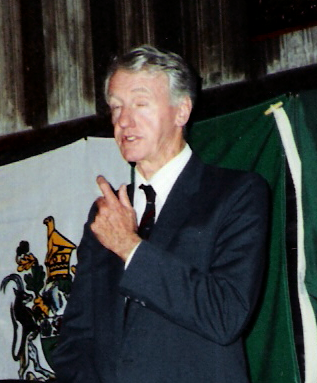The Great Betrayal: The Memoirs of Ian Douglas Smith, Africa's Most Controversial Leader
First published in June 1997.
Works
The Great Betrayal
Ian SmithFamous Ian Smith Quotes
Ian Smith - A Bit Of A Rebel, Ian Smith
BBC News Obituary of Ian Smith http://news.bbc.co.uk/2/hi/africa/1136865.stm, 20 November 2007.
BBC News 'On this day' http://news.bbc.co.uk/onthisday/hi/dates/stories/june/1/newsid_2492000/2492915.stm, June 1.
On the end of white minority rule in 1979.
“If Smith was a black man, I would say that he was the best Prime Minister that Zimbabwe ever had.”
Morgan Tsvangirai, Leader of the Movement for Democratic Change, 1999[citation needed]
About
Nigel Rees, "Sayings of the Century", Unwin paperbacks, 1984, p. 247.
Radio broadcast, March 20, 1976.
Peter Godwin, Comment in the Guardian(UK) Newspaper http://www.guardian.co.uk/commentisfree/2007/nov/25/comment.zimbabwe.
Ian Smith Quotes about people
Ian Smith - A Bit Of A Rebel, Ernest Mtunzi, Former UK Representative of Joshua Nkomo
Ian Smith - A Bit Of A Rebel, Ian Smith
Ian Smith - A Bit Of A Rebel, Ian Smith
Patrick Kombayi, Opposition Politician and former Gweru Mayor, Article http://www.telegraph.co.uk/news/worldnews/1570403/Zimbabweans-praise-generous-Ian-Smith.html in The Telegraph, 2007.
About
Ian Smith - A Bit Of A Rebel, Ian Smith
Joshua Nkomo (On the UDI).[citation needed]
About
Ian Smith Quotes
Michael Knipe, "Mr Smith agrees to majority rule coming within two years", The Times, September 25, 1976, p. 1.
Statement (September 24, 1976) on negotiations in South Africa which proposed a phased transition to majority rule.
David Coltart, Opposition Politician and member of the Zimbabwe Parliament (House of Assembly and Senate) since 2000[citation needed]
About
Peter Hain, Foreign Office Minister in Tony Blair's British government, The Observer, 1999
About
Ian Smith, as quoted in Heidi Holland, Dinner with Mugabe, Penguin Books; Reprint edition (5 Feb 2009), ISBN 0143026186.
BBC News 'On this day' http://news.bbc.co.uk/onthisday/hi/dates/stories/august/31/newsid_2510000/2510755.stm, August 31.
Reaction to the 1977 general election in which his government was re-elected overwhelmingly.
Harold Wilson, former British Prime Minister, interviewed by the BBC in 1979. While passing through Heathrow airport, Wilson had a chance encounter with Smith en-route to Lancaster House. The two had coffee together, and Wilson's comments were made after their meeting.
About
Ian Smith - A Bit Of A Rebel, Ernest Mtunzi, Former UK Representative of Joshua Nkomo
“Ernest Mtunzi, Former UK Representative of Joshua Nkomo”
Ian Smith - A Bit Of A Rebel
Context: Ernest Mtunzi, Former UK Representative of Joshua Nkomo.
BBC News 'On this day' http://news.bbc.co.uk/onthisday/hi/dates/stories/march/2/newsid_2514000/2514683.stm, March 2. "Smith recalls era of savages in skins", The Times, March 3, 1970, p. 8.
At a press conference on March 2, 1970, when Rhodesia declared itself a Republic.
Lord Carrington, as quoted in Heidi Holland, Dinner with Mugabe, Penguin Books; Reprint edition (5 Feb 2009), ISBN 0143026186.
About
Ian Smith - A Bit Of A Rebel, Ian Smith
“All the soul of man is resolution, which in valiant men falters never, until their last breath.”
Ian Smith, "Bitter Harvest".
